Flourish FM
What does it take to flourish? We started Flourish FM to share cutting edge research from world experts on how to thrive, so you can take away big ideas and practical steps to enhance your life, the lives of others, and, ultimately, make the world a better place. Flourish FM is hosted by Dr. Jon Beale and Dr. Nick Holton, and in collaboration with the Human Flourishing Program at Harvard University, the Department of Education at the University of Oxford, and The Shipley School.
Episodes
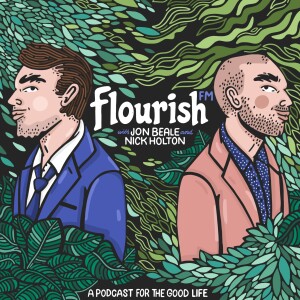
Tuesday Aug 01, 2023
Tuesday Aug 01, 2023
Joining us today is Dr. Gabriella Rosen Kellerman a respected author, entrepreneur, and Harvard-trained physician, who has extensive expertise in the realms of behavioral and organizational change, digital health, well-being, and AI. In collaboration with Professor Martin Seligman, Gabriella co-authored her debut book Tomorrowmind, which provides crucial strategies and practical guidance to confronting the ambiguous prospects of the workplace. Throughout her career, Gabriella has held significant roles in the corporate world. She served as the Chief Product Officer and Chief Innovation Officer at BetterUp, a prominent transformation platform catering to global professionals.
In our conversation, we discuss her motivation behind writing the book on workplace well-being, the key components of the Tomorrowmind, and why there is a need for broader dissemination of their research. Dr. Kellerman unpacks the PRISM concept and explains the skills needed to excel in the current work environment. We also explore concepts of well-being, shifting from “meaning” to “mattering”, fostering a positive mindset, and how to measure well-being. Additionally, Dr. Kellerman shares the story behind BetterUp, the incredible and much-needed research the company performs, and the science of thriving at work. Tune in and discover the path to increased well-being, performance, and fulfillment with Dr. Gabriella Rosen Kellerman!
Key Points From This Episode:
The motivation behind writing the book and why the research is so crucial.
Essential skills for thriving in today's work environment: PRISM.
How technology is shaping the workplace and driving change.
Why resilience and mattering are crucial for flourishing in a changing workplace.
Shared experiences, social connection, and the impact of remote work.
Shifting from time famine to time abundance to foster social connection.
We explore the PERMA model and the concept of well-being.
Transitioning from "meaning" to "mattering" in relation to work.
The role of vitality and physical health in thriving in the workplace.
BetterUp, how it was founded, and its research focus.
How coaching can help individuals in the workplace.
Insights and advice for flourishing in the workplace.
Links Mentioned in Today’s Episode:
The Antifragile Academy
Dr. Gabriella Rosen Kellerman
Dr. Gabriella Rosen Kellerman on Instagram
Dr. Gabriella Rosen Kellerman LinkedIn
BetterUp
Tomorrowmind
‘Homo Prospectus’
‘Giving Time Gives You Time’
Professor Martin Seligman
The Shipley School
Flourish FM Podcast
Flourish FM on Twitter
Flourish FM on Instagram
Flourish FM on YouTube
Flourish FM Survey
Jon Beale
Nick Holton
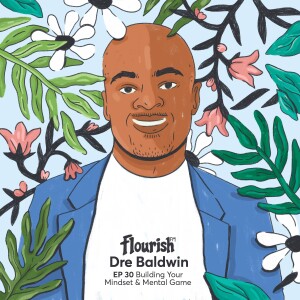
Tuesday Jul 18, 2023
Tuesday Jul 18, 2023
Whether you’re just starting out or you want to take your career to the next level, having the right mindset is essential for success. And no one knows how to turn unrelenting self-belief into hard-and-fast career results better than author, entrepreneur, business coach, and former international basketball pro, Dre Baldwin! Known as DreAllDay by his fans, Dre developed his signature Work On Your Game framework to help professionals of all kinds with accountability, strategy, execution, and most importantly mindset.
Join us today as Dre highlights the importance of developing the right mental game for flourishing, why mental toughness, discipline, confidence, and initiative are crucial, and what it means to “work on your game” (and the most effective ways to do so), plus so much more! Dre does an incredible job of translating complex subjects into actionable and easy-to-understand advice that will help you play the mental game in a way that launches you toward unparalleled achievement. So, don’t miss this episode with personal development junkie, Dre Baldwin!
Key Points From This Episode:
How Dre equates thriving or flourishing with being in a flow state.
Four key principles for achieving any goal: discipline, confidence, mental toughness, and personal initiative.
Practical resources to help you flourish in your personal and professional life.
What it means to Dre to “collect the right dots” in order to connect them in the future.
The Big Domino strategy for focusing your energy on the areas that matter.
How to find people and places that best support the outcome you wish to achieve.
The role of discomfort in any form of personal or professional achievement.
Influential people from Dre’s journey, including the coach who kicked him off his college team.
When to grit and when to quit: why mental toughness isn’t just about perseverance.
Why Dre believes that your mental game is the foundation of both success and failure.
Personal development as an essential starting point for “working on your game.”
Distinguishing between who you want to be and what you want to do.
Measurements of success and how to create your own definition.
The causal connection between purpose, focus, and success.
Tips for building and maintaining a high level of self-discipline.
A lesson on the inherent relationship between mindset, mental game, and flourishing.
Links Mentioned in Today’s Episode:
Dre Baldwin
Dre Baldwin on LinkedIn
Dre Baldwin on Twitter
Dre Baldwin on Instagram
Dre Baldwin on YouTube
Daily Motivation Texts
Work on Your Game University
Work on Your Game Podcast
Work on Your Game
Robert Kiyosaki
Tim Ferriss
‘Steve Jobs' 2005 Stanford Commencement Address’
Russell Brunson
The Slight Edge
Outwitting the Devil
The New Psycho-Cybernetics
The Antifragile Academy
The Shipley School
Flourish FM Podcast
Flourish FM on Twitter
Flourish FM on Instagram
Jon Beale
Nick Holton
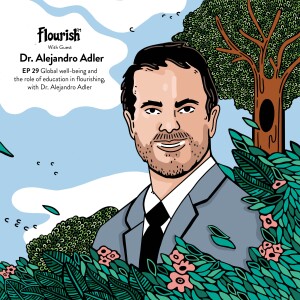
Wednesday Jul 05, 2023
Wednesday Jul 05, 2023
Today our focus is on the importance of education and the role of teachers and mentors in facilitating human flourishing, and we are joined by Dr. Alejandro Adler, who does an amazing job of illuminating the research and findings on this subject. Dr. Adler is the Dean of Student Life and Wellbeing at Upper Canada College and has had a varied career acquiring a wealth of experience in international well-being initiatives and projects.
Dr. Adler's professional focus has been squarely on well-being, education and skills, human capital development, and public policy. He has worked with and advised many organizations across the globe on the value of positive psychology and life competencies. In our chat with Dr. Adler, we get into the science of well-being, worldwide research on the subject, and, most importantly, how we can approach integrating the science into our educational systems. So to hear it all in this fascinating chat with a great guest, press play now.
Key Points From This Episode:
Dr. Adler talks about how he conceptualizes and explains human flourishing.
Unpacking various undesirable states of ill-being.
Defining meaning and its relationship to belonging.
Dealing with short-term, deeply negative experiences and trauma.
Reflections on global studies on well-being and the evolution of Dr. Adler's views.
The three 'M's of well-being and how to approach supporting students.
Exploring the different kinds of leaders and organizations that these lessons apply to.
Comments about Finland, its education system, and the decisions that have contributed to its success.
Closing thoughts from Dr. Adler on the role of education in the promotion of global well-being.
Links Mentioned in Today’s Episode:
The Antifragile Academy
Upper Canada College
Dr. Alejandro Adler on LinkedIn
Dr. Alejandro Adler on Thought Leadership Institute
Dr. Alejandro Adler on IPEN
Dr. Alejandro Adler on Upper Canada College
Dr. Alejandro Adler on ResearchGate
Dr. Alejandro Adler on Twitter
Positive Education / Alejandro Adler at Positive Psychology Tour 2019 on YouTube
'Well-being in education in childhood and adolescence'
'Teaching Well-Being increases Academic Performance: Evidence From Bhutan, Mexico, and Peru'
Olli-Pekka Heinonen
The International Baccalaureate Organization
The Shipley School
Flourish FM Podcast
Flourish FM on Twitter
Flourish FM on Instagram
Jon Beale
Nick Holton
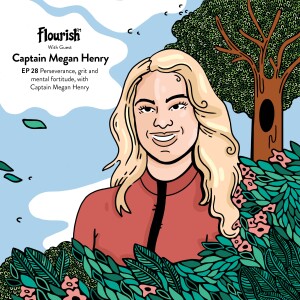
Tuesday Jun 20, 2023
Tuesday Jun 20, 2023
Today we are very glad to welcome Captain Megan Henry to the show, and we have a wonderful and insightful conversation with her about her career and the lessons she has learned about mental training, mindfulness, and focus. Megan is a former field hockey and track athlete, having competed for the national team in skeleton. Her focus is now on Olympic weightlifting and her studies as a mental performance coach!
Megan shares many great pieces of wisdom and experience with us, touching on managing stress, achieving oneness in activity, how meditation has changed her life, and why it is so vital to escape comparison and obsession with outcomes. We also hear her thoughts on social media, anxiety, mood, and a whole lot more, so make sure to listen in with us now!
Key Points From This Episode:
The importance of mental training and a few of the lessons that Megan learned during her time as an athlete.
Connecting the threads between the different parts of Megan's career.
Megan talks about her health journey and transitioning her work into the mindset space.
The impact of meditation and mindfulness practices on Megan's performance and presence.
Thoughts on the dangers of skeleton and building stress tolerance.
The steps and stages of confronting anxiety and fear.
Megan's first crash early on in her skeleton career.
Understanding how Megan went about shifting her focus away from comparison.
Escaping the traps of overthinking and its damaging effects on performance.
Practical steps that Megan took to enhance her ability to focus on herself.
The connection between our mood and ability to perform.
Megan's final lesson on flourishing and practical methods to unblock the way.
Finding and connecting with Megan online.
Links Mentioned in Today’s Episode:
The Antifragile Academy
Megan Henry
Megan Henry on Instagram
Megan Henry on Twitter
American University Washington DC
Cool Runnings
Tim Gallwey
The Chimp Paradox
The Shipley School
Flourish FM Podcast
Flourish FM on Twitter
Flourish FM on Instagram
Jon Beale
Nick Holton
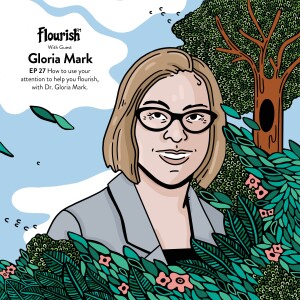
Sunday Jun 04, 2023
Sunday Jun 04, 2023
Today’s very special guest is Dr. Gloria Mark, the Chancellor's Professor of Informatics at the University of California, Irvine, and author of Attention Span: A Groundbreaking Way to Restore Balance, Happiness and Productivity. Her work is primarily focused on the deep examination of multitasking, interruptions, and mood as they pertain to the use of digital devices.
In our conversation, Gloria defines attention, the different types of attention, psychological balance, and flow. She also explains why attention is always goal-oriented, how we’ve developed kinetic attention in this digital age, whether our dwindling attention spans are cause for concern, and how we can use technology to promote well-being rather than productivity. Tune in now to learn how to use social media strategically, how to replenish your attention reserves, and so much more with the remarkable Dr. Gloria Mark!
Key Points From This Episode:
Joining us today is the author of Attention Span, Dr. Gloria Mark.
Gloria tells us about her research and what led her to write her book.
What attention is, and its role in well-being and living a fulfilled life.
The different types of attention.
How our attention resources are limited.
Gloria explains why our attention is always goal-oriented.
An introduction to kinetic attention.
Whether we should be concerned about the rapid reduction of our attention spans.
If our attention span and behavior change when we go offline.
How we’ve developed kinetic attention in response to the modern world.
Gloria’s hypothesis on why our attention spans have gotten shorter in this digital age.
The tension trap of randomly reinforced behavior.
How we can use technology to support well-being rather than productivity.
The role of psychological balance as it relates to the different types of attention.
Simple activities that you can do to replenish your attention reserve.
The attention trap of social media and how to use it strategically.
Gloria defines flow and its role in the working lives of people today.
The precondition to flow: a focused and engaged attention.
What Gloria means when she says that “rhythm is the new flow.”
Her lesson on flourishing for listeners, and practical ways to implement it.
Links Mentioned in Today’s Episode:
The Antifragile Academy
Dr. Gloria Mark
Attention Span: A Groundbreaking Way to Restore Balance, Happiness and Productivity
Dr. Gloria Mark on LinkedIn
Dr. Gloria Mark on Twitter
Dr. Gloria Mark on Facebook
University of California, Irvine
Columbia University
‘The broaden-and-build theory of positive emotions’
The Shipley School
Flourish FM Podcast
Flourish FM on Twitter
Flourish FM on Instagram
Jon Beale
Nick Holton
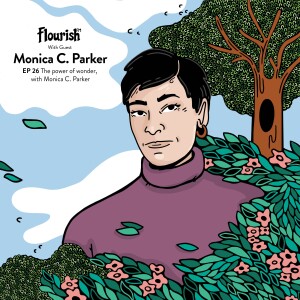
Wednesday May 17, 2023
Wednesday May 17, 2023
In this episode, we are very lucky to have an amazing conversation with the author of The Power of Wonder, Monica C. Parker! Monica is a prominent speaker and writer, the founder of HATCH Analytics, and has an unusually varied career, having worked as an opera singer, policy director, homicide investigator, CEO, and museum exhibition director!
In our chat, we get to pick Monica's brain about her research into what wonder can do for the human mind and body, and she explains how building a mindset focused on experiencing wonder can lead to continual flourishing. We get into her argument for aiming for wonder over happiness, how meaning and gratitude figure into her framework, and how to use curiosity as a powerful processing tool. Join us to hear it all!
Key Points From This Episode:
Monica shares an overview of her path to her current work researching wonder.
How the idea of flourishing fits into Monica's work.
Defining and conceptualizing wonder; Monica's focus on the emotional experience.
Understanding the roots of our ability to experience wonder.
Monica differentiates between shallow and deep curiosity.
Steps for developing a 'wonder mindset'; prioritizing novelty, mixed emotions, and more.
Tips for having a 'wonder-walk', and the power of priming the mind.
The practices that help us slow down the mind.
Monica speaks about the effects of nostalgic and grateful thinking.
The issue with aiming for happiness and our inability to forecast accurately.
How curiosity can help us process past traumas.
The composite effects of wonder on our mental and physical state.
Exploring Monica's argument for wonder being the highest good.
Measuring and assessing our relationships with these concepts.
Implementing the mindset of a beginner.
Fighting against the modern tendency to completely avoid boredom.
Monica's final lesson on flourishing and practical steps for its implementation.
Links Mentioned in Today’s Episode:
The Antifragile Academy
Monica C. Parker
The Power of Wonder
HATCH Analytics
Monica C. Parker on Twitter
Monica C. Parker on LinkedIn
Martin Seligman
Steve Jobs
Rick Hansen
Blast from the Past
Shigehiro Oishi
Todd Kashdan
Scott Barry Kaufman
Dacher Keltner
David Yaden
The Shipley School
Flourish FM Podcast
Flourish FM on Twitter
Flourish FM on Instagram
Jon Beale
Nick Holton
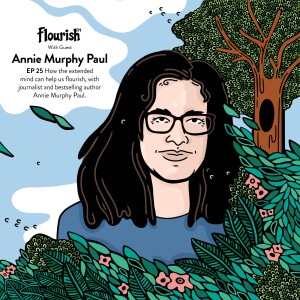
Wednesday May 03, 2023
Wednesday May 03, 2023
Today, we talk to journalist and bestselling author Annie Murphy Paul about how the “extended mind” can help us flourish. She is an acclaimed science writer whose work has appeared in the New York Times and Scientific American, among many other publications. She has also authored various books, including Origins, The Cult of Personality, and the topic of today’s discussion, The Extended Mind.
In our conversation with Annie, we discuss the extended mind's three types of cognition (embodied, situated, and distributed) and what it means to be a "loopy" creature. We explore practical strategies for leveraging distributed cognition in our daily lives, workplaces, and relationships, learn about the impact of physical spaces on perception, and other fascinating insights on the topic. Join us for an insightful episode that will broaden your understanding of the human mind and the world around us. Tune in now!
Key Points From This Episode:
Annie’s motivation for writing The Extended Mind and what she hopes to achieve.
Insight into the extended mind concept and its relationship to human flourishing.
Contrasting the extended mind with the view of the brain as the sole controller of the body.
Three types of cognition of the extended mind: embodied, situated, and distributed.
How the three types of cognition impact individuals, teams, and communities.
How thinking in groups and sharing ideas play into the extended mind concept.
Steps to achieving collective intelligence.
How digital and analog technologies extend our thinking and its relation to situated cognition.
Diversity in collective intelligence, distributed cognition, and team success.
How physical spaces impact cognition and the restorative effects of natural environments.
Physical movement, social interaction, and the role they play in thinking.
Practical strategies for utilizing distributed cognition in daily life, work, and relationships.
How the different types of cognition overlap in our daily lives.
Being a "loopy" creature and the role of physical movement and social interaction in thinking.
Whether non-embodied or non-extended thinking exists.
The best way to leverage the extended mind concept toward human flourishing.
Links Mentioned in Today’s Episode:
The Antifragile Academy
Annie Murphy Paul
Annie Murphy Paul on LinkedIn
Annie Murphy Paul on Twitter
The Extended Mind
‘The Extended Mind’
The Good Life
The Shipley School
Flourish FM Podcast
Flourish FM on Twitter
Flourish FM on Instagram
Flourish FM on YouTube
Jon Beale
Nick Holton
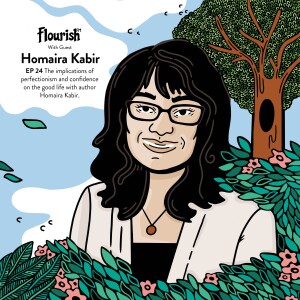
Wednesday Apr 19, 2023
Wednesday Apr 19, 2023
While our drive for excellence and perfectionism can help us to strive for great results and improvement, it can also come at a cost. On the show today, we welcome Homaira Kabir, life coach, speaker, and author of the new book Goodbye, Perfect. Homaira has a master's degree in coaching psychology, positive psychology, and the scientific study of human flourishing, and is also the founder and CEO of The Goodbye Perfect Project.
In our conversation with Homaira, we delve into her work, how she helps her clients, and some of the subject matter from her inspiring book. Our guest does an outstanding job of explaining the concepts of confidence and perfectionism and the connection between these two forces within us. She also introduces the idea of 'secure' striving, how to fall in love with yourself, and so much more. Make sure to tune in to catch it all!
Key Points From This Episode:
Homaira opens by sharing some of her key ideas about flourishing.
Unpacking the metaphor of flourishing as a fruit-bearing tree.
The importance of confidence on the path to flourishing.
Zooming in on Homaira's use of the term mastery.
How Homaira approaches building confidence with her female clients.
The interesting interaction between perfectionism and confidence.
Understanding the explicit and implicit sides of confidence.
Homaira’s strategies for building optimal confidence.
The 'dual work' that is necessary to change our beliefs through our behavior.
A comprehensive explanation of perfection and how it hinders our ability to flourish.
How to get started on the journey of growth and confidence!
The ideas of mattering, meaning, and purpose.
Connecting with ourselves in the right way and emotionally repairing damages.
A closing lesson in compassionate awareness and practical steps for putting it into action.
How and where to find and connect with Homaira online!
Links Mentioned in Today’s Episode:
The Antifragile Academy
Homaira Kabir
Goodbye, Perfect
The Goodbye Perfect Project
Life is a Highway Podcast
Martin Seligman
Carol Ryff
Episode 15 with Marisa G. Franco
Marisa G. Franco
Transcend
Scott Barry Kaufman
Episode 3 with Scott Barry Kaufman
Dr. Lisa Miller
Episode 16 with Dr. Lisa Miller
Paul Gilbert
The Shipley School
Flourish FM Podcast
Flourish FM on Twitter
Flourish FM on Instagram
Jon Beale
Nick Holton
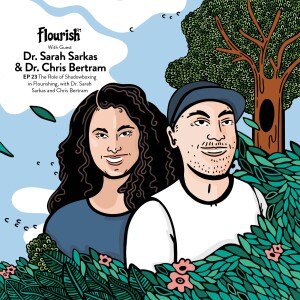
Tuesday Apr 04, 2023
Tuesday Apr 04, 2023
Today we are joined by “Jedi of the unconscious”, Dr. Sarah Sarkis, and applied neuroscientist, Dr. Chris Bertam. Between the two of them, they have a vast range of expertise which converges on their common pursuit, the Shadowboxing Podcast. In this episode, we discover what shadowboxing is and how it relates to flourishing.
Chris and Sarah share their thoughts on what it means to flourish, how it relates to flow, and the importance of learning to tolerate struggle. Theory aside, our guests impart some practical advice for increasing your tolerance for discomfort, from cold water submersion to the simple art of breathwork. Tune in for some helpful tools for overcoming shadow boxes and ultimately, flourishing.
Key Points From This Episode:
Introducing Drs. Chris Bertram and Sarah Sarkis.
The genesis of the name of their podcast, Shadowboxing.
What “shadowboxing” means to Sarah and Chris, respectively.
The shared goal of their collaboration.
Sarah and Chris’ range of expertise and the effectiveness of an integrated approach.
How our guests conceptualize flourishing.
The crossover between flow and flourishing.
Discussing the value of struggle.
How to increase your tolerance for discomfort.
The benefits of controlled exposure to cold water.
Exploring the struggle of stillness.
The connection between shadowboxing and flourishing.
How it’s best to help people help themselves, and why it’s so important to do so.
Why Sarah believes that biology trumps psychology.
The mind-body connection and the effectiveness of breath work.
Tools for overcoming shadow boxes.
Chris and Sarah’s final words of (very practical) advice.
Links Mentioned in Today’s Episode:
The Antifragile Academy
Dr. Chris Bertram on LinkedIn
Dr. Chris Bertram on Instagram
Dr. Chris Bertram on Twitter
Dr. Sarah Sarkis
Dr. Sarah Sarkis on LinkedIn
Dr. Sarah Sarkis on Instagram
Dr. Sarah Sarkis on Twitter
Shadowboxing Podcast
EXOS
The Shipley School
Flourish FM Podcast
Flourish FM on Twitter
Flourish FM on Instagram
Jon Beale
Nick Holton
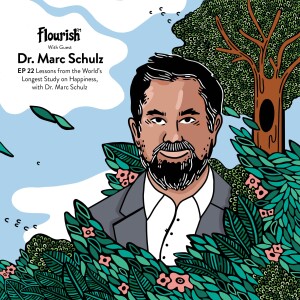
Tuesday Mar 21, 2023
Tuesday Mar 21, 2023
In today's episode, we go deep into the idea and components of a good life with Associate Director of the Harvard Study of Adult Development, Dr. Marc Schulz. Marc is the co-author of the The Good Life (2023), a Professor of Psychology at Bryn Mawr College, a psychologist, and a practicing therapist.
This conversation covers a selection of the interesting and enriching findings presented in Marc's book, practical strategies for developing social fitness, where material wealth should fit into our priorities, and why difficult experiences are such a necessary component of flourishing. The main thrust of Marc's recent work and today's chat is the central importance of relationships and how we can best aid the nurturing and maintenance of these.
Key Points From This Episode:
Marc introduces the Harvard Study of Adult Development and the field of adult development.
Clarifying the language used in the study and the two components that make up the 'good life'.
Forging a good life through challenges and difficult experiences.
The themes of aspiring and becoming in Marc's understanding of flourishing.
Marc talks about the different types of relationships that contribute to a good life.
Navigating and handling the inevitable conflict in our relationships.
Gratitude and appreciation and the benefits of generosity and giving.
The critical role that relationships play in the maintenance of happiness and health.
Marc unpacks the idea of social fitness and how we build it through reflection and awareness.
Money and happiness; the healthiest ways to use material ambitions as a means rather than an end.
Human weakness around forecasting and common regrets that Marc has identified.
Marc's strategies for avoiding unnecessary regrets and improving forecasting.
A story from The Good Life about human connection, shared interests, and hope.
Maintaining human connections within the array of demands on our time.
Marc's closing lesson about flourishing and leaning into relationships.
Links Mentioned in Today’s Episode:
The Antifragile Academy
Dr. Marc Schulz
The Good Life
Marc Schulz on LinkedIn
Bryn Mawr
Harvard Study of Adult Development
Robert Waldinger
Lydia Denworth
Why Good Things Happen to Good People
Stephen Post
Dan Pink
Robert Waldinger TED Talk
The Shipley School
Flourish FM Podcast
Flourish FM on Twitter
Flourish FM on Instagram
Jon Beale
Nick Holton






